The Gist
- Top chatbot picks. We narrowed multiple options down to nine standout platforms based on reviews, ratings and expert insights.
- AI meets CX. Chatbots are evolving from FAQ tools into full-funnel digital agents driving sales, marketing and service.
- Key buying factors. Features like NLP, workflow automation and human handoff now define the best chatbot providers in 2025.
If you're finding it difficult to choose a chatbot platform, you're not alone. We understand that sifting through hundreds of options to determine the top choices can be overwhelming. In the process of compiling our Top 10 list, we recognized the challenge and put in the effort to identify the best chatbot providers for you.
Table of Contents
- Why off-the-Shelf Chatbot Platforms May Not Fit Your Needs
- Navigating Chatbot Customization and Functionality
- From Rule-Based Scripts to AI-Powered Agents
- Making the Chatbot Cut: How We Made Our List
- 1. Intercom
- 2. Birdeye
- 3. Tidio
- 4. Drift by Salesloft
- 5. Freshchat by Freshworks
- 6. IBM watsonx Assistant
- 7. Cognigy
- 8. Boost.ai
- 9. Conversational Agents, Formerly Google Dialogflow CX
- Choosing the Right AI Chatbot Technology
- AI Chatbot Selection: What Enterprises Need to Know
- Implementation Strategy for AI Chatbots
- Core Questions for Top Chatbot Providers
Why off-the-Shelf Chatbot Platforms May Not Fit Your Needs
The problem starts with trying to categorize chatbot providers into neat hierarchies based on quantifiable criteria such as an industry they serve or a type of interaction they support. This is because chatbots all use similar tech and serve a similar function: to help a human do something without having to either a) do it themselves (e.g., finding the answer to a question or turning on the lights using Amazon’s Alexa) or b) talk to another human.
As chatbots have evolved from reactive support tools into proactive business enablers, their strategic value has become harder to ignore. The best off-the-shelf solutions now go beyond automation to enhance the entire customer journey—from first contact all the way to post-sale engagement.
Andre Oentoro, CEO at Breadnbeyond, an explainer videos business, told CMSWire, "Two years ago, our chatbot was primarily an FAQ tool. Now, it’s a full-funnel assistant with qualifying leads for sales, delivering tailored video recommendations for marketing, and even collecting customer feedback post-project for service improvement. The leap in AI comprehension has allowed chatbots to handle more nuanced conversations without constant human intervention."
Oentoro explained that his business has seen chatbots evolve into multi-role digital agents, working in multiple departments and creating a more cohesive customer journey. The transformation was made possible by improvements in AI’s ability to understand and respond to more complex inquiries.
Navigating Chatbot Customization and Functionality
Even if the chatbot is doing nothing but supplying simple responses to simple queries such as “What time do you open?” the chatbot will still require your organization to provide those answers. While pre-trained, industry-specific chatbots do exist, many chatbot providers have offerings covering multiple industries and levels of functionality. Choosing the “best” provider for your needs gets complicated fast.
And there are the providers themselves. Some companies are just developers that build chatbots using a chatbot platform provider’s technologies. Many providers offer a chatbot as part of a much larger set of integrated marketing and lead-generation services.
Finally, the gap between automation and authentic customer care is narrowing—thanks to a select group of chatbot providers that are no longer focused on just answering queries, but on delivering adaptive, human-centered experiences.
“A select group of providers has made a significant leap forward by evolving from basic automated responses to offering profoundly intelligent, all-inclusive, and genuinely human-focused solutions in 2025,” said Moustapha Abdel Sater, chief commercial officer at B2BROKER, a global fintech solutions provider.
“In my experience, the top chatbot platforms today are those that understand the importance of seamlessly blending AI with human expertise, rather than just passing the baton.” Sater explained that platforms such as Intercom and Zendesk have distinguished themselves in 2025 by integrating bots into broader service ecosystems, rather than treating automation as a standalone function. This fusion enables more fluid, personalized customer journeys.
Related Article: What 2025 Data Tells Us About the Future of Chatbots in CX
From Rule-Based Scripts to AI-Powered Agents
Until recently, most chatbots operated as glorified decision trees—scripted to guide users down predefined paths. But the rise of generative AI and real-time NLP has fundamentally changed that paradigm. Today’s leading chatbots can understand nuance, remember context across multi-turn conversations, and even adapt their responses based on user sentiment or intent.
This leap has elevated chatbots from reactive support tools to proactive, AI-powered agents that play a critical role in customer experience, sales, and marketing. As a result, evaluating a chatbot’s intelligence—its ability to personalize, route, and learn—has become just as important as assessing its integrations or UX design.
Related Article: Do Chatbots Get Us Any Closer to Human-Level Artificial Intelligence?
Most Common Chatbot Features Sought by Enterprises
This table highlights the most in-demand chatbot features that enterprises look for when evaluating solutions.
| Feature | Description |
|---|---|
| Omnichannel Support | Handles conversations across web, mobile, social, and messaging platforms like WhatsApp and Facebook Messenger. |
| AI/NLP Capabilities | Uses natural language understanding to interpret complex inputs, intent, and sentiment for more human-like interactions. |
| Workflow Automation | Integrates with CRM, ticketing, and ERP systems to automate support, sales, or onboarding workflows. |
| Analytics & Reporting | Provides dashboards to measure performance metrics like resolution rate, CSAT, and drop-off points. |
| Human Handoff | Transfers users to live agents when needed, with context preserved and routing based on issue type or customer tier. |
| Multilingual Support | Handles multiple languages natively or through integrations for global operations. |
Making the Chatbot Cut: How We Made Our List
To create this list, we looked for companies that showed up on at least one review site and favored those that appeared on multiple sites. The review sites we used were Capterra, G2 Crowd and TrustRadius. We searched each site using multiple terms including "chatbot," "chatbot provider," "chatbot developer" and "chatbot platform."
To narrow the results, only companies with 4.0 stars and above at least 100 reviews were selected. To further stratify this list we cross-referenced it with chatbot platform lists from AIM, Helpjuice, Chatbots.org and 99signals.
Firms that appeared on one or more of these lists received preference. However, in a few cases—such as Cognigy, Boost.io, and Google Conversational Agents—we made exceptions based on strong expert endorsement, unique platform features, or high relevance to current business use cases. This got us to the Top 9 list you see below.
Related Article: 6 Ways ChatGPT May Change Digital Customer Experience
Top 9 Chatbot Platforms Compared (2025)
A comparison of leading chatbot platforms, their best use cases, notable customers, awards/ratings and pricing models.
| Platform | Best For | Notable Customers | Awards / Ratings | Pricing Info |
|---|---|---|---|---|
| Intercom (Fin) | AI-powered customer support with human fallback | Amazon, Meta, Atlassian | Momentum & Implementation Leader (2025, G2) | Custom pricing |
| Birdeye | Multi-channel reviews & chat for SMBs | RingCentral, Aspen Dental, Bekins | #1 in 97 categories (219 badges) – G2 Summer 2024 | $299+/mo |
| Tidio | Live chat + AI bot combo | Zendesk, Microsoft, Shopify users | AI Company of the Year – Global Business Tech Awards 2025 | Free then ~$29+/mo |
| Drift | B2B sales & lead qualification | State Street, SAP Concur, Okta | Top 50 Analytics & AI Products – G2 (2023) | Starts ~$2,500/year |
| Freshchat | Chat across messaging platforms | Klarna, Blue Nile, Dunzo | TrustRadius Best of – Multiple Categories (2022) | Free plan then ~$15+/agent/mo |
| IBM watsonx Assistant | Enterprise-grade NLP chat | Geico, Camping World | Best AI Software – G2 (2025) | Usage-based with free tier |
| Cognigy | Omnichannel AI agent orchestration | Bosch, Lufthansa Group, Mercedes-Benz, Toyota, Nestlé | Leader – Forrester Wave (2024); Avg. G2 score 4.6–4.8 | Custom pricing |
| Boost.ai | Banking, insurance, public sector bots | MSU Federal Credit Union, Santander Bank, Audi | Leader – G2 IVA Grid (2022); 4.8/5 stars | Custom pricing |
| Google Conversational Agents (Dialogflow CX) | Complex bot flows & enterprise deployment | Genesys Cloud integrations (e.g., Woolworths) | Top-tier NLU; Gartner: excels in model performance | Usage-based; $600 free trial credit |
1. Intercom

Intercom provides customer service teams from more than 25,000 global organizations, including Atlassian, Amazon and Lyft Business, with the ability to create personalized customer experiences using a low-code chatbot development platform.
Marquee customers: Amazon, Meta, Atlassian, Microsoft, Amplitude
Pricing: Based on seats and number of unique people reach per month
Awards: 2025 Tidio Momentum Leader and Implementation Leader for AI Customer Support Agents
Reviews (from Capterra):
Positive:
- "Generally Intercom is a very good professional product. They have good support, good training materials and they are always releasing new features."
- "The product once you get past the setting up and figure out everything on your own, is great and meets our needs. It's easy to chat with leads and customers and easy to install on any website."
- "I liked how easy Intercom was to install, without needing Engineering help beyond the time it took to insert the widget. I can update the user experience to A/B test all through the application."
Negative:
- "There is no API call to "archive the segment" despite that it was proposed a few years ago. Intercom offers one of the worst client libraries on the whole Github and they reject PR's."
- "Also, a lot of Ad block tools catch Intercom as an ad and blocks it — thus creating inconvenience for end users having to choose between."
- "Customer service is terrible and they just don't give two hoots about their customers. Constantly introducing new features but not actually fixing the main feature that someone would need."
2. Birdeye
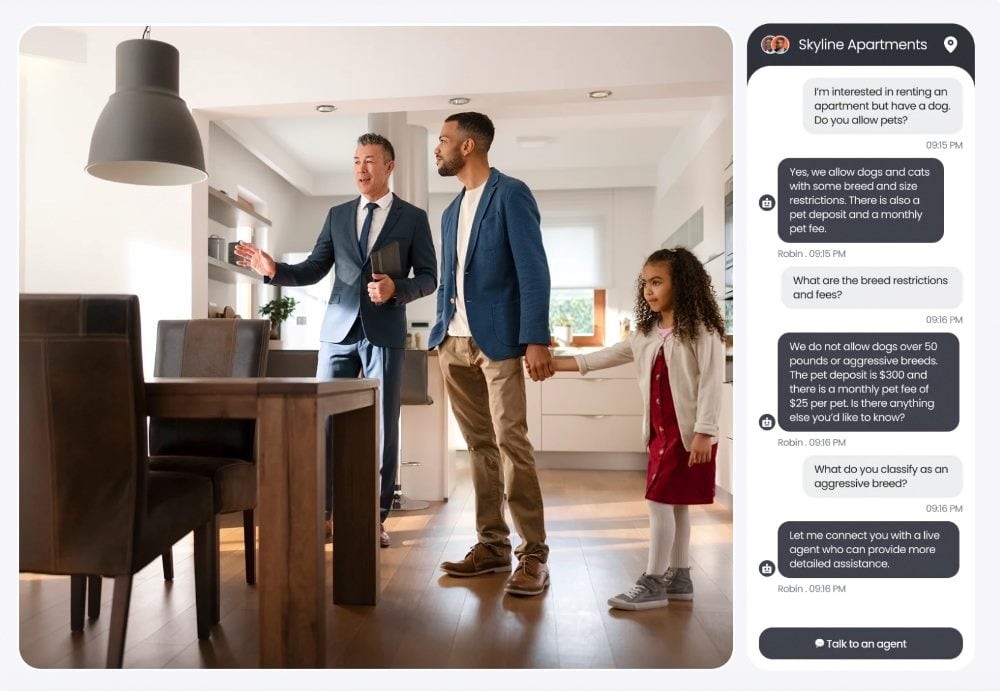
Birdeye is a customer experience platform provider that deploys a suite of tools designed to help small businesses collect, manage and analyze customer feedback, as well as to generate insights that can be used to improve customer service, increase sales and improve efficiency.
Birdeye offers automated surveys, reviews and reputation management, helping businesses to build a positive image on social media and review sites. Additionally, Birdeye provides customer engagement and marketing automation tools including chatbots, to help businesses nurture relationships with their customers and drive more sales.
Marquee customers: Bekins Moving, RingCentral, Aspen Dental
Pricing: $299 per month and up
Awards: Dominated G2’s Summer 2024 Reports—received #1 rankings in 97 categories and 219 badges
Reviews (from Capterra):
Positive:
- "Experience has been great and support is super helpful. We will continue for a long time with BirdEye."
- "I love the convenience of having your big players all in one spot. Ease of reading and responding to reviews."
- "It has helped us tremendously in gaining feedback from our customers as to how satisfied they are with our services and to enlighten us as to ways we may improve our services moving forward."
Negative:
- "Sometimes old correspondence will pop up in our 'Open' inbox and I'm not sure why that is. It could be user error, but IDK."
- "The customer support is one of the worst that we have ever dealt with."
3. Tidio

Tidio is an AI-powered customer service platform that offers a range of features, including automated customer engagement, live customer support, analytics, smart customer segmentation, advanced analytics and chatbot technology for a customer service bot or other custom bots.
Marquee clients: None listed
Pricing: $33 per user, per month
Awards: Global Business Tech Awards 2025's AI Company of the Year
Reviews (from Capterra):
Positive:
- "It has been a great experience to interact with my clients."
- "The free level is excellent and a smart way to get folks in the door and provides good basic services including, most importantly to me, chat bot."
- "The support is excellent, the service is excellent and I loved it."
Negative:
- "Will tell after few time more but I have a problem to contact direct with people due to timing."
- "The pricing for extra users is really the bad aspect of this tool."
Related Article: The Contact Center's New MVP? AI Chatbots That Know When to Escalate
4. Drift by Salesloft
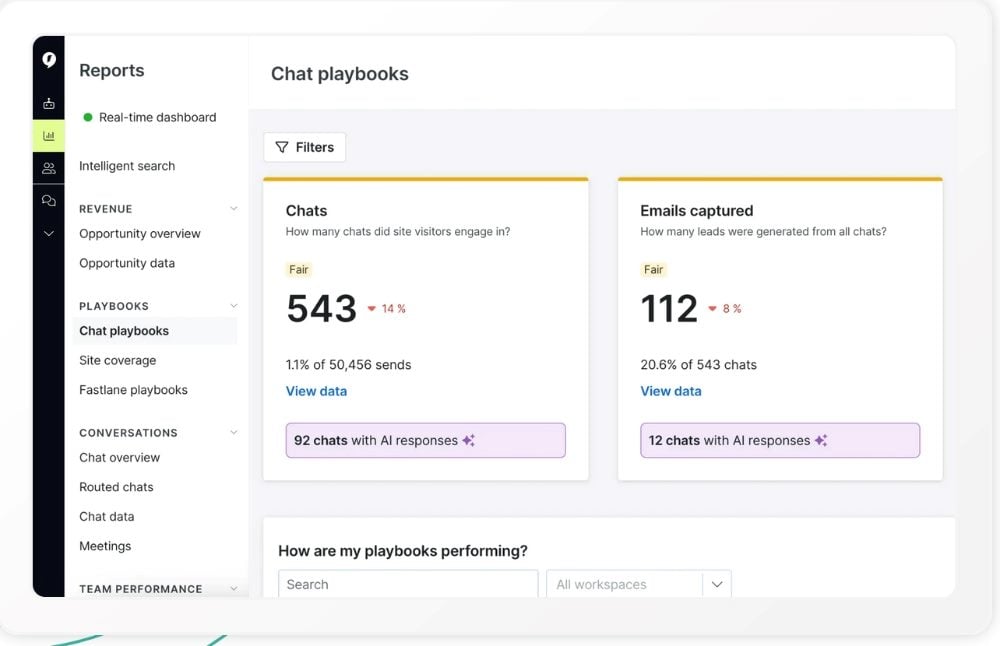
Drift is a chatbot company that provides conversational marketing and sales technology. It uses automated messages, automated emails and live chat to help more than 50,000 businesses engage with their customers. It also provides analytics data insights to help organizations understand how customers are interacting with their product or service.
Marquee clients: State Street Global Advisors, SAP Concur, ProofPoint, Okta
Pricing: $2,500 annually and up
Awards: 2023 G2 Crowd — Top 50 Analytics & AI Products
Reviews (from Capterra):
Positive:
- "Great communication interaction with prospects."
- "Drift also makes the chats very personalized and fun to interact with. That feeling gives our prospects a sense of comfort when they visit our site."
- "Honestly, it's the best software out there for that purpose. It's east to implement and start using, the results are coming fast and everything is measurable...."
Negative:
- "Drift has a couple key problems — one being the overly simplistic and confusing backend UI."
- "So after losing a month+ in the process, Drift accepted to cancel the subscription BUT still charged us and refused to refund the initial month."
5. Freshchat by Freshworks
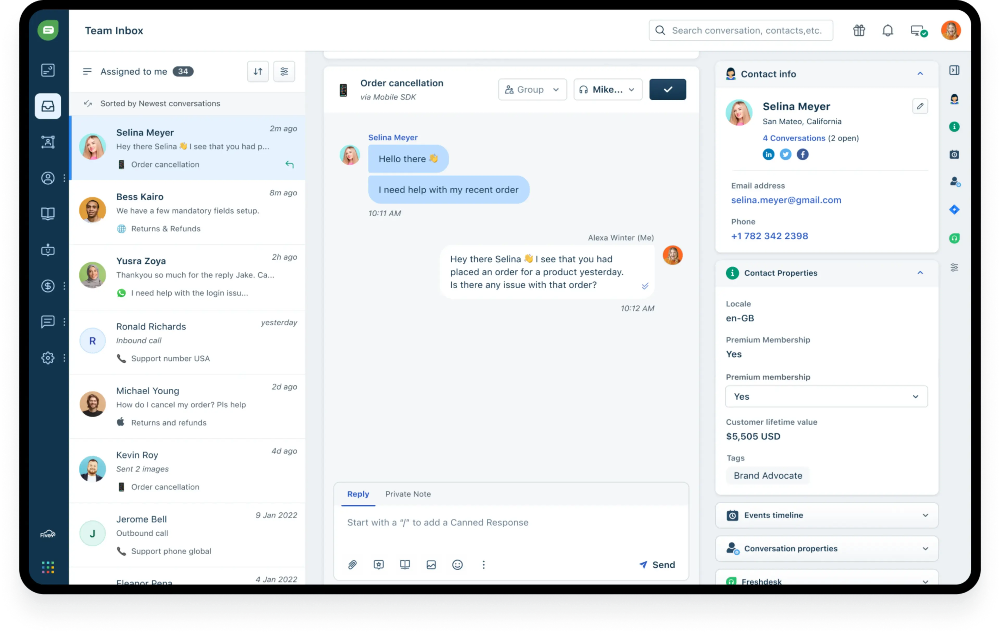
Freshchat offers AI-powered customer messaging chatbots across various channels like WhatsApp, Apple Business Chat, Facebook Messenger, website, mobile app and others. Organizations use Freshchat to create automated workflows and use AI-driven insights to optimize customer experience. Freshchat also integrates with other customer service tools, such as Salesforce and Zendesk to provide a unified customer experience.
Marquee clients: Klarna, Blue Nile, Harvey Norman, Dunzo
Pricing: $15 per agent, per month and up, Free plan available
Awards: 2022 TrustRadius Best of — Multiple categories
Reviews (from Capterra):
Positive:
- "I loved the fact that you could have live conversations with customers or visitors to my website. This way it is easier to make them buy a service before they leave."
- "And they do ... and we respond from the very friendly and easy dashboard for us. Also it has a free version, which fits our needs for now, which is great."
Negative:
- "I am highly disappointed in the Freddy chatbot. It was supposed to their best chatbot but I was extremely disappointed with it."
- "However, occasionally, the human sales associates aren't knowledgeable, tired of answering questions, therefore rude and careless or have to ask another associate."
- "Sometimes I forget to check the messages and I miss a lot of chat queries because of not receiving desktop notifications for new chat messages. I check emails less often."
Related Article: Just Chatbots? What AI in Customer Experience Really Looks Like
6. IBM watsonx Assistant
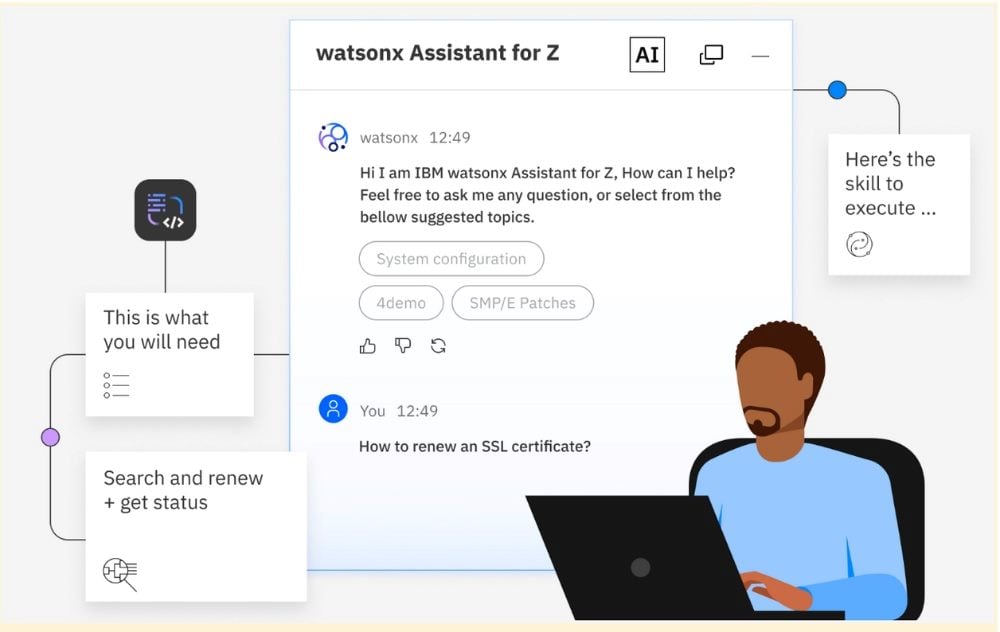
IBM watsonx Assistant is a conversational artificial intelligence platform designed to improve traditional support functions through AI-powered virtual agents and AI-powered chatbots. Watson Assistant can be used to automate processes like order taking, scheduling appointments and customer onboarding. It also integrates with CRM and other back-end systems to create customer self-service and track progress across the buyer’s journey.
Marquee clients: None listed
Pricing: $140 per month and up, Free option is available
Awards:Won 2025 G2 Best of Software Awards' Best AI Software Products
Reviews (from TrustRadius):
Positive:
- “It performs NLP very well and this permits it to be utilized for a scope of undertakings, for example, client care, information investigation, and, surprisingly, authoritative record analysis.”
- “It has the ability to create and manage virtual agents very easily and in a short period of time.”
- “Provides detailed information on interactions between chatbot and users.”
Negative:
- “Its NLP abilities could be improved to all the more likely distinguish and break down the feeling of discussions.”
- “With this platform it is possible to create very efficient virtual assistants, although I consider that its user interface has much room for improvement.”
- “This platform meets all our requirements, the only negative aspect is its price.”
7. Cognigy
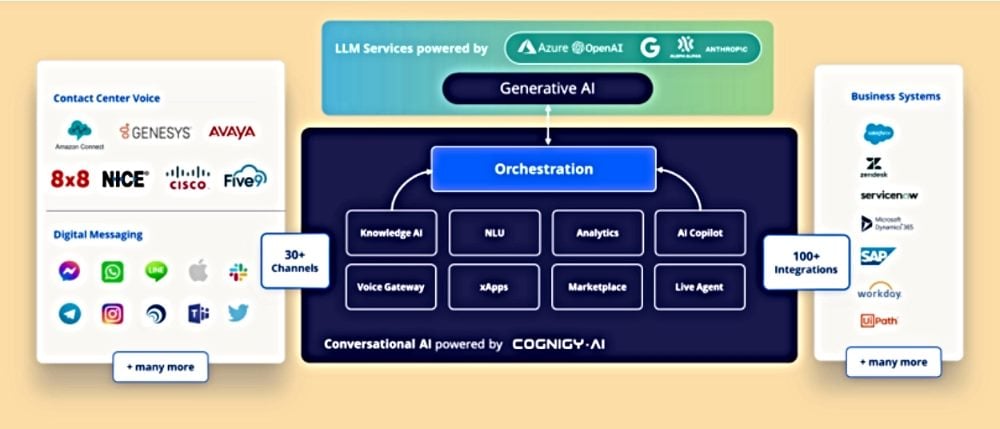
Cognigy is an enterprise orchestration platform built for multi-channel, AI-augmented customer service. It supports voice and chat, offers natural handoff to human agents, handles multilingual interactions, and integrates deeply into backend systems to drive automation at scale.
Marquee customers: Toyota, Bosch, Lufthansa, Henkel
Pricing: Contact vendor (enterprise model)
Awards: Highest evaluation on Gartner Peer Insights in Enterprise Conversational AI and Conversational Platforms (4.8–4.9 average) with 97–100% recommendation rate.
Reviews (G2): “Cognigy as a platform is very easy to use — quick to learn, fast to build solutions and has a great library of integrations… it is a powerful and transformative tool to enhance the customer and agent experience.”
8. Boost.ai
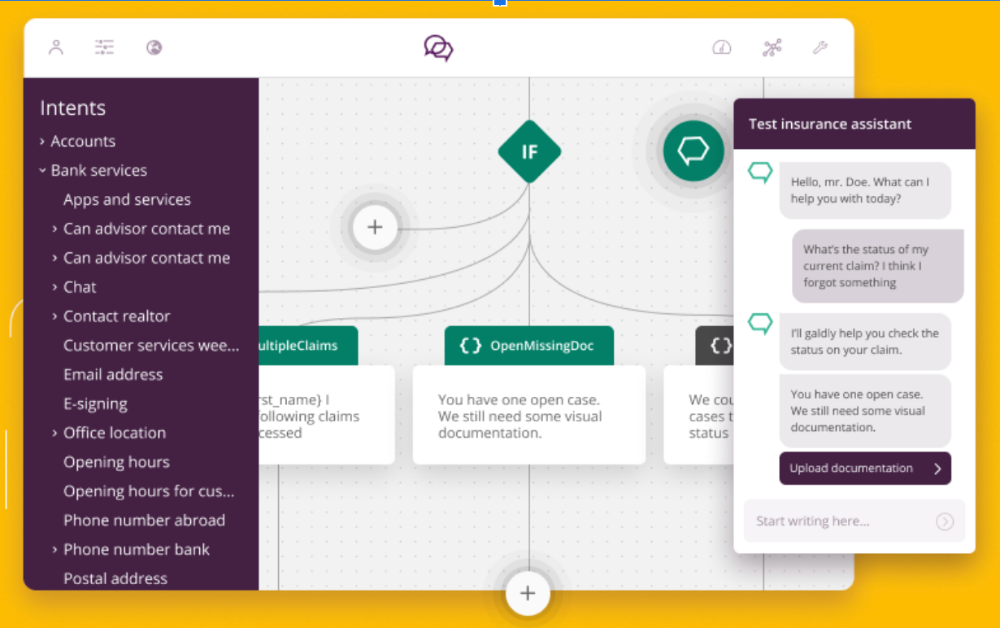
Boost.ai powers enterprise-level virtual agents with a self-learning AI engine that dramatically reduces training time and delivers accurate, context-aware interactions across channels. It supports advanced analytics and pain free integrations with systems such as Zendesk and Salesforce.
Marquee sectors: Financial services and government deployments in Europe; strong presence in public sector and banks
Pricing: Available via quote request
Ratings: 4.8/5 on G2 for Generative AI and omnichannel capabilities
Review (G2): “The most powerful NLU/NLP in the market yet the most user-friendly platform. Easy and fast to implement and empowered with a lot of pre-trained content for relevant industries and processes.” - Johan L. - Verified User in Information Technology and Services
9. Conversational Agents, Formerly Google Dialogflow CX
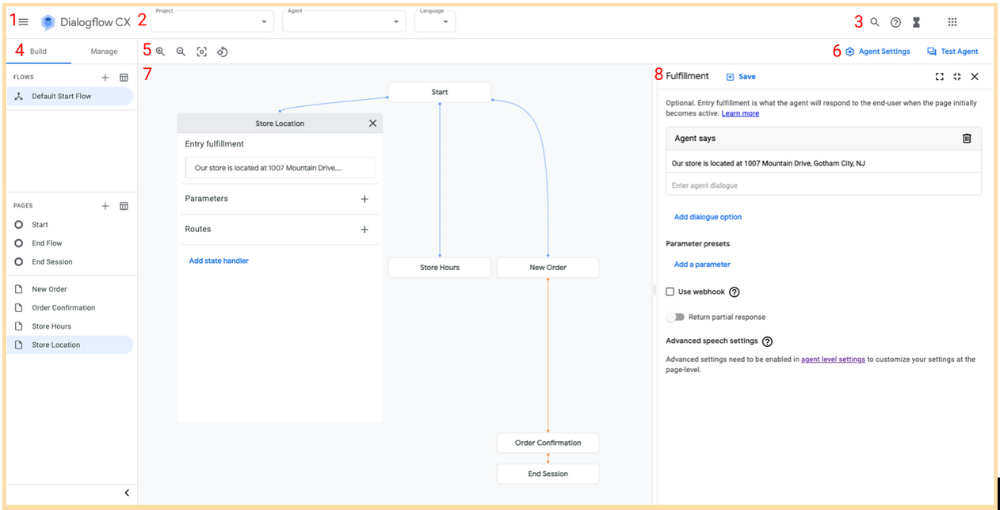
Conversational Agents, formerly called Google Dialogflow CX, is Google’s enterprise conversational engine designed for complex, branching dialogs. Based on natural language understanding (NLU), it offers flow-based conversation design, simple Google Cloud integration, and powerful NLU—making it ideal for high-scale, contextual agent experiences.
Marquee fit: Ideal for enterprise teams needing deep customization and multi-platform deployment.
Pricing: Standard Google Cloud pricing; includes a $600 free trial credit for new customers
Analyst feedback (Gartner): Dialogflow CX (Conversational Agents) “excels in model performance, but can improve in operational features.”
Review (G2): “The visual flow builder in Dialogflow CX (Conversational Agents) made it much easier for me to design conversation flows. It’s user-friendly, the functions are easy to understand, and it allowed me to deploy bots across web, mobile apps, and voice platforms like Google Assistant and Alexa.” - ANUJ J., Analyst
Choosing the Right AI Chatbot Technology
Choosing the right AI chatbot provider can be a daunting task, but our Top 9 list based on high reviews from multiple sites makes it easier for both enterprise and small business clients to find the best options.
Look into each provider's capabilities and use cases and ensure you select what you need in a chatbot — like artificial intelligence, natural language processing, sentiment analysis, etc. While off-the-shelf chatbots may seem like a convenient solution, customization is often required to make them fit a brand's specific needs.
By taking into account multiple review sites and cross-referencing chatbot provider lists, we have identified the top chatbot providers to help you navigate the complexities of AI chatbot customization and functionality.
AI Chatbot Selection: What Enterprises Need to Know
Organizations face mounting pressure to deploy AI chatbots as customer expectations for instant, round-the-clock support continue to rise. Gartner predicts that by 2025, 80% of organizations will use generative AI for customer service, while early adopters report productivity gains of up to 15%.
Two Chatbot Categories Dominate the Market
Enterprise buyers can choose between rule-based and AI-powered solutions. Rule-based chatbots rely on scripted logic and work best for simple, repetitive tasks. AI-powered alternatives use natural language processing and machine learning to handle complex, unstructured queries while improving performance over time. The decision hinges on interaction complexity, integration requirements and organizational needs.
Customer Journey Mapping Drives Selection
Successful chatbot deployment begins with mapping customer journeys. Organizations must identify common questions, decision points and escalation triggers before evaluating solutions. Customization requirements also matter. Some enterprises need bots that match brand tone, support industry-specific workflows or integrate with backend systems like CRMs and payment platforms. Integration capabilities are critical for delivering personalized, context-aware service.
Testing & Analytics Shape Implementation
IT teams should evaluate chat interfaces for responsiveness, natural language understanding and contextual adaptation. Ongoing monitoring of usage patterns and learning capabilities helps ensure measurable value delivery. Cost analysis extends beyond ROI calculations to include productivity gains and customer satisfaction improvements.
Omnichannel Support Becomes Standard
Modern chatbots provide consistent support across web, mobile, social and messaging platforms. Vendors not covered in this article like Anthropic, Intercom, Ada and Forethought are advancing agentic, multimodal experiences with deeper integration capabilities.
Trust & Accuracy Take Priority
Organizations increasingly demand chatbot responses grounded in verified content that remain traceable and auditable. New metrics including answer accuracy, confidence levels and sentiment analysis are replacing traditional session counts.
Implementation Strategy for AI Chatbots
The most effective chatbots align with operational needs, integrate with existing tech stacks and adapt to customer expectations while delivering reliable support. Organizations should start with pilot programs focused on primary use cases, then expand based on measured productivity and satisfaction gains. Successful chatbots also recognize when to escalate complex issues to human agents—and sometimes, when to drop a pun to keep things light.
Editor's note: This article, originally published March 10, 2023, was updated Aug. 20, 2025, with new information.
Core Questions for Top Chatbot Providers
Editor's note: Key questions surrounding the role of enterprise chatbot platforms and must-have features for businesses in 2025.
Leading enterprise chatbot platforms in 2025 include IBM watsonx Assistant, Google Conversational Agents (Dialogflow CX) and Boost.ai. These platforms are known for their advanced AI capabilities, seamless integrations and scalability for enterprise needs. Key chatbot features for businesses include omnichannel support, natural language processing, CRM integration, analytics and the ability to escalate to a live agent. Enterprises also value security, scalability and multilingual capabilities.
Learn how you can join our contributor community.
